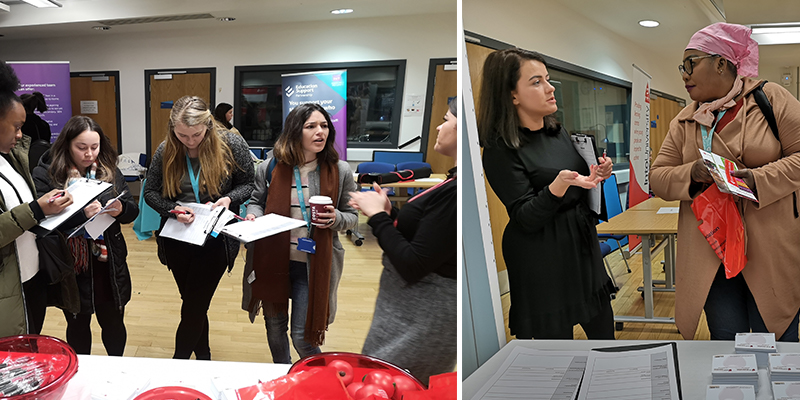How to effectively teach from home
Coronavirus has thrown us into a world of chaos and uncertainty. As a result of growing restrictions schools are having to figure out and adapt to new ways of delivering their pupils education.
We’ve put together some helpful tips you can follow if you find yourself suddenly becoming a virtual teacher.
Establish a work space
When working from home it’s important to differentiate home space from work space. This will help create a clear division between your work life and personal life.
Make sure your work space is light, airy and not cluttered. To avoid any unnecessary distractions whilst delivering online classes, keep your background plain and reduce any glares from windows by closing the curtains.
If space is limited don’t worry, you can still change the space around you. For example, having text books, pens, paper and worksheets on hand during work and then putting them away out of site when you finish work.
Plan ahead and test
Technology is vital for remote learning being successful, however using new technology for the first time can be daunting. Spend some time familiarising yourself with the new resources you’ll be using. Speak to other colleagues with their experiences and carry out a trial run to make sure any technical glitches are ironed out.
Decide as soon as possible who will be responsible for what types of IT support, and how they will be reachable by students, families, and staff. Make sure they all know how to reach out for support.
Give teachers, students, and families video and written instructions on how to use your platform so they can answer some of their own questions before reaching out for help.
Structure and schedule
Your school should provide with a timetable to follow and list of what topics to cover. However, if your school does not provide this then we would strongly recommend you create your own. This will help keep you in routine and help you to plan your work.
Pupils will also benefit from a structured day which has routine similar to how they would have had if they were learning in school.
A structure and schedule will also help draw the line between ‘work time’ and ‘personal time’ giving you a balance of them both. Include time for breaks so that your pupils and yourself have a break as you would in school.
Set expectations
Talk to your pupils and help them understand the new way of learning. Listen to their concerns, questions and reassure them. This will be just as daunting for them as it is for you. Tell them what you are expecting from them including homework, deadlines, time keeping and behaviour. Keep parents fully informed and make sure they are aware your expectations. You’ll need their contribution to make sure this works.
Let go of perfectionism
Virtual teaching is a new challenge for everyone, so try not to overcomplicate the work you are delivering. Don’t worry about the finer details or trying to make your slides all singing and dancing. When teaching online keeping things simple is key. This will help to avoid any technical glitches such as files not loading correctly or applications freezing.
Remember everyone will be using different types of devices i.e. desktop PC, laptops to tablets so it’s important this is taken into account.
Make it fun
No matter how old your students are, they will all appreciate from a bit of fun. Plan some time in during the day for quizzes, games and even throw in some meditation, yoga, or just quiet time to help them relax and prepare for what’s next. There are lots of online activities you can access and do a group. It will help them to release energy and prevent them from burning out.
Additional resources
Don’t try to do create everything yourself, use the array of online resources available. There are thousands of free projects, worksheets, educational videos, guides and audio clips you can download. Below are some of the popular online resources.
BBC Teach https://www.bbc.co.uk/teach
BBC Bitesize https://www.bbc.co.uk/bitesize
Twinkl https://www.twinkl.co.uk/
We Are Teachers https://www.weareteachers.com/
2 simple https://2simple.com/purple-mash/
Classroom secrets https://kids.classroomsecrets.co.uk/
iDEA https://idea.org.uk/about
History Learning Site https://www.historylearningsite.co.uk/
Find time for yourself to reflect and re-focus
Online learning is a new experience for you and your students. Make time for yourself to reflect on how the experience is going for you and for your students—but remember: you’re not expected to be perfect.
Ask yourself questions like:
- Are all the children engaged and focused?
- Are you able to deliver what you set out to do?
- What could I do to make learning more accessible, inclusive, and meaningful?
- How are we, as a class, doing physically, mentally, and emotionally?
It’s also worth asking colleagues to see how they are getting on with online teaching. Sharing ideas, tips and collaborating together will help to deliver a more effective education.
Use teacher assessments and cancel 2021 exams
Due to the ongoing disruption in students’ education as a result of the coronavirus pandemic next year’s public exams may have to be cancelled.
The National Education Union (NEU) have said more pupils are being sent home due to higher Covid-19 infection rates which makes going ahead with exams unfair and less likely to take place.
However, the government is committed to GCSE and A-levels taking place next summer, however they are considering to delay it by a few months.
An official spokesman said “We are working with the exam boards and Ofqual on our approach, recognising that students experienced considerable disruption to their education last year.”
Dr Mary Bousted, NEU joint general secretary said this was a position that was becoming "increasingly untenable" and teachers urgently needed to know what evidence of pupil achievement they needed to collect so fair assessments could be made. Her comments were made a day after national attendance figures revealed one in six secondary schools were not fully open to all pupils last week, with 16% having to send at least some pupils home to self-isolate amid a rise in virus cases.
It also follows comments from several university vice-chancellors who have all called for next year's exams to be cancelled, and for the focus to be on pupils catching up missed learning instead.
Dr Bousted said national figures showed 200,000 children and young people were not in school last week, and that with 7,000 new cases nationally yesterday (29/09/20) alone, disruption was inevitable.
"All of that makes it more and more difficult to see that students will get the opportunity to consistently be in school across the country," she said.
"As the situation develops it may become inevitable that what we have to move to is a system of centre-assessed grades... everybody appears to agree that this is a real possibility - that we won't be able to do exams.
"The only body which is sort of sticking its head in the sand, sticking its fingers in its ears, is the government, and that is what they have done consistently in this crisis.
Kenneth Baker, a former education secretary who introduced GCSEs has also called for the exams, along with A levels, to be cancelled in 2021 due to the continued disruption to learning caused by the coronavirus pandemic.
In a letter written to the current education secretary Gavin Williamson urging him to accept that teacher assessment "will have to be used again next year.”
And, in order for this to happen, guidance will need to be provided to schools on “the sort of report that teachers should be keeping for each student now, not only on attendance, but on performance as the weeks and months go by", he said.
Michael Morpurgo, one of Britain’s popular children’s author has voiced his opinion and called for the “tension and fear” to be taken away from pupils who have missed so much work during the pandemic.
The author of The War Horse said the 2021 GCSE and A-level grades should be based again on teacher assessments, as they were this year after exams were cancelled due to the coronavirus.
He said: “Teachers know the children best, and to take the tension off it should be so again.” Grading should be “teacher led and teacher judged”.
Algorithm Chaos
This summer’s exam chaos was caused by a faulty algorithm that purposely down graded grades in ways that were described as "unfair and unfathomable" by head teachers. Students were given grades based on teacher assessments moderated by an algorithm.
The algorithm was quickly discredited and marks were recalculated based solely on teacher assessments.
Many headteachers are calling for papers to be pushed back from May to July to give students time to catch up.
A Department for Education spokesperson said: "We expect exams to take place next year and continue to work with Ofqual and the exam boards on our approach, recognising that students will have experienced considerable disruption to their education in the last academic year.
"There are a range of measures proposed by Ofqual following a public consultation, including a possible short delay to the exam timetable and subject-specific changes to reduce pressure on teaching time. We will continue to work with school and college stakeholders, Ofqual and the exam boards, to ensure that exams in 2021 are fair."
TLTP Education NQT Recruitment Events
Throughout the year TLTP Education attend university recruitment fairs meeting enthusiastic students who are studying for their PGCE and BA Education degree and will soon be looking for their first teaching role as a Newly Qualified Teacher.
Each year we help hundreds of NQTs start their teaching career in all divisions of education, including: Early Years, Primary, Secondary and SEN.
We have an extensive network of schools all of which we work closely with on a regular basis. As a result, we are able to gain valuable insight into their school’s requirements, needs and ethos. Which, in return we are able to closely match with suitable candidates.
Over the past four months TLTP Education have been very busy visiting universities including:
- University of East London
- St. Mary’s University
- Roehampton University
- Cambridge University
- University College London – Institute of Education
- Bedfordshire University


It’s been a pleasure meeting bright and talented graduates and we are looking forward to meeting many more.
We are continuing our tour and will be visiting Goldsmiths University on Thursday 13th February 2020 and Greenwich University Friday 14th February 2020.
On a daily basis we are liaising with schools across all of London and the Home Counties to understand their NQT vacancies, therefore we are receiving new roles constantly. Schools are keen to get ahead of the game to secure talented graduates, and, as a result interviews are now being scheduled.

If you would like to be informed as soon as a new job opportunity is available, please Register and subscribe to job alerts to ensure you never miss our latest roles. Alternatively, contact us on 020 8709 6540 and a consultant can talk through your individual requirements.
If you prefer for us to call you, no problem. Simply, click here to fill in a few details and a member of the recruitment team will be in touch.
We can help ease the stress of finding your ideal NQT role, give you maximum exposure to the job market, and more importantly leave you to focus on completing your PGCE!
10 wonderful perks of being a teacher
Working in the field of teaching often comes with a bad rep. From being underpaid to the pressure of classroom management, it’s fair to say that teaching is not an easy job.
However, being a teacher can also leave you with an abundance of joy and happiness.
Whether it’s the positive impact you’ve made to a child’s academic, emotional and social learning or the set of skills and knowledge you’ve acquired along the way; here are our 10 reasons why teaching remains a rewarding career choice.
1. Children teach you as much as you teach them
Being around young children and adults six hours a day can keep you feeling young. They can positively influence your vocabulary, fashion sense and ensure you are kept up to date with the latest pop culture references.
2. No day is ever the same
Most jobs come with a lot of repetitive tasks, which can sometimes result in feeling unfulfilled and unchallenged. Teaching is one of the few professions where you get the chance to be creative and engage in something new every day.
3. You are a role model
Ever heard the expression, with great power comes great responsibility? As cliché as the saying may sound, teachers are highly admired for being a good role model to their students. It is a great accomplishment when children can look to you to guide and advise them not just with school work but also with their social life. In fact, being an inspiration to young leaders is just one of the many perks of the job.
4. Expect to laugh… a lot
Children may be a handful at times, but there’s no denying their ability to make you chortle. They are a bundle of joy and, most of the time, have a great sense of humor. So if you’ve had a bad start to the day, you can always rely on your students to cheer you up and make you laugh. It’s these precious moments that make teaching absolutely worth it.
5. Learn new skills
Being a teacher allows you to expand and develop on new skills. Whether your chosen subject is English, Maths or Science; as a teacher, you can choose to build upon transferrable skills by participating in sports days, managing breakfast and after school clubs and can even offer counseling sessions. Did we mention that no day is ever the same?
6. Establish genuine relationships along the way
Working in teaching enables you to build positive relationships with students, parents and the wider school community.
7. Make friends for life
You get the opportunity to form real and long-lasting friendships with like-minded colleagues, who share the same passion for teaching as you do.
8. That memorable and cherished moment when a student finally gets it
Nothing beats the moment when a student’s lightbulb goes off and they finally understand what you’ve been teaching them. Witnessing their growth and knowing you contributed to the child’s learning progression is a feeling like no other.
9. Schools out for summer
There are many rewarding highlights of being a teacher. However it can be sometimes feel chaotic and nonstop, which is why teachers are rewarded with a much-needed and well-deserved six-week summer break. While your non-teacher friends continue to work their 9-5 jobs, you get the chance to relax, recharge and enjoy your summer holiday. The summer break is also the perfect opportunity to reflect on your teaching strategies and improve on lesson plans, if needed, for the upcoming school year.
10. End of year teacher gifts
Whether it’s a hand-made appreciation card or a purchased gift, it’s really the thought that counts. There are so many advantages of being a teacher, fact. However, the best feeling is knowing you are educating tomorrow’s leaders and opening the door to all other professions. Now that is the ultimate job satisfaction.
How to be a first-class Supply Teacher
Everyday schools rely on Supply Teachers to fulfil unexpected vacancies that arise. For over 10 years London Teaching Pool Ltd have built a reputable service in supplying teachers at very short notice to schools across London and the Home Counties. We rely on our supply teachers to consistently be skilled, reliable and deliver a quality service to all of the schools they are assigned to. The title ‘Supply Teacher’ often has negative perceptions associated to it, these include, having an ‘easy life’, being ‘job hoppers’, hold ‘no responsibilities’ and require ‘no planning’. We know this is completely the opposite and in fact supply teaching is far more daunting and stressful than it looks. Walking into an unknown school, into an unknown class and not knowing what planning or work or behaviour problems are ahead of you – it is not an easy way to make a living.
Supply teachers are an essential part of the education system in the UK; without them the system would collapse. Schools prefer to recruit the same supply teacher particular those that left with a positive impression and often enough are offered much longer term and permanent contracts.
Here are our top ten tips on being a first-class Supply Teacher
1. Work closely with your agency
Choose a recruitment consultancy who specialise in teaching roles. It wise to stick to one agency where you can build a relationship with one consultant. Here at London Teaching Pool Ltd we provide supply for Primary, Secondary and SEN roles across London and the Home Counties. Each one of our 40 Education consultants are committed to providing a first-class service ensuring your best interests are always looked after. You will meet with your consultant and communicate regularly to ensure your needs are always met.
2. Be ready and flexible
Schools often rely on supply teachers due to a last minute absence. This means you will often be approached with little or no notice, for example, you may receive a call from your agency at 7:30am about a role that starts at 8:30am. It is important you are always ready and have a degree of flexibility to ensure you gain access to as many opportunities as possible. Let your agency know when you register that you are happy to be called with little notice. It is also important to keep your agency informed with your availability and to call them as well as them contacting you.
3. Do NOT be late
Lateness of supply teachers is the biggest turn off for schools where timetables are extremely strict. Being late not only makes a bad impression to senior leaders and hiring managers but it will also set you off on the wrong foot with the children you are about to teach. By arriving on time or even better early, you will have the chance to familiarise yourself with the school and the other teachers. It will also mark you out as someone a school can rely on. Ensure you plan ahead before you leave and if you are going to be late inform your consultant so that the school can kept up to date.
4. Do your research
As soon as you know what school you will be working at, find out from the agency if there is any more information they can provide you with. For example, are there any pupils with special needs that you might need to prepare for or who may require a teaching assistant present? Additionally, check out the school’s website as this can often give you a flavour of the school and tell you if it has any particular specialisms.
5. Dress to impress
Make sure you always have a professional, clean, ironed work outfit ready the night before. It takes less than 10 seconds to make a first impression, so make sure your clothing sends the right message. Having an outfit ready means less hassle in the morning when you receive a last-minute assignment. Make sure you stand out to ensure you have the best chance of being remembered and called back for future work.
6. Pack an Emergency Supply Kit
Sometimes the teacher you are about to fill in for may not have left any notes to follow especially if it is an unplanned cover i.e. sickness. It is essential you are prepared for such scenarios by bringing your own resources and activity ideas along with you. As a supply teacher it is always good to have something up your sleeves for the unexpected and always have a back-up plan.
7. Before you leave
Leave a handover note for the regular class teacher as they will be in the dark about what their class has been doing. Always ensure the classroom is tidy and everything is put back as you found it when you arrived.
8. Find out about routines
The start of the day is crucial to how well the rest of the day will go, so make sure that you are aware of the daily routine including as fire alarm drills. Children will be reassured those routines have not changed and that you are in command and will prevent you from being caught out whilst in the middle of teaching.
9. Get to know the class
Before you start the lesson spend five minutes getting to know the children in your class. Introduce yourself and why you are there and go around the class asking all children to say their name and something about them i.e. their hobbies / favourite toy.
10. Gratitude and feedback
It is courteous to thank the head teacher on your last day and let them know how you got on. As long as you have performed to your best this will greatly increase your chances of being asked back. It is also important to speak to your consultant and let them know if you would be interested in working there again so they can relay this to their client. Be open and honest, when we know what works for you and what does not we are able to tailor the work to you and ensure that your needs are met as well as those of the school. If you are unhappy, do not bottle it up, be honest about your experiences good or bad, we can and will listen and adapt things to help you.
Supply teaching is a fantastic career choice, one that can provide flexibility and the ability to increase your experience in a short space of time, this is why in particular Newly Qualified Teachers (NQTs) are encouraged undertake such roles. Hopefully by following these tips you will give yourself the best chance of success. Good luck!
View all our supply jobs and apply today!
Teaching tips for NQTs
It’s September, the start of a new term and your first proper teaching job. Thinking how you will get through your first few weeks, let alone the first year can be quite daunting. The first few weeks in a new job can be both mentally and physically draining, for new teachers this can be very overwhelming. It is important you put yourself first during the induction period to absorb as much information about the school, taking in lots of advice and getting to know the staff – it is almost being like one of the children and will become an invaluable part of your new life at school. Teaching can be one of the most rewarding careers for you and life changing for the children you teach. But it does take a lot of dedication and a lot of work behind the scenes to help make it work.
Here are our top 10 tips to help you get through your first year…
1. Fail to prepare, prepare to fail
Lesson planning is crucial to your success. Understand the curriculum and prepare exciting, engaging and challenging lessons. Be your own teacher - take time out to experiment and take risks to establish your own technique. Think back to your own school days and how the teachers who inspired you made you love your subject. Learn from experienced colleagues, find out what’s worked for them and also see what other NQTs are doing. Have ‘back up’ lessons plans ready in case something does not go to plan, always have something hidden up your sleeve and be ready to pull it out if needed in an emergency. It is also a good idea to build a portfolio of lesson plans, the portfolio should include your lesson plans, notes, activities, worksheets, quizzes, exams, etc. It will be time consuming to start with but this will save you a lot of time in the future and you will have a comprehensive teaching resource that will make your job much easier from that point on. This is your chance to put into practice all that you've learnt.
2. Get to know the class
Understanding the children you are about to teach is invaluable and can really help you in the long run. Firstly you will need to remember all the children’s names which can be quite difficult and then their interests, their behaviours, family members and what they like to do. You can do this through in a number of interactive games and classroom activities. It will show the children that you care about them, gain their trust and also help the children get to know on another.
3. Networking
All first year teachers should rely upon a mentor teacher to assist and guide them through the first year. Having a support system of other teachers is invaluable. It is also essential to forge healthy relationships with all personnel in the school. Each staff member has a particular area of expertise that you will likely need at some point. Make sure you go into the staffroom regularly and talk to your new colleagues. Where possible take part in school functions and projects. The best schools are based on teamwork, and while everyone appreciates you have a lot to do, it is important to build positive relationships. It will make it much easier to ask for help and support when the time comes.
4. Tidy classroom, tidy mind
Your classroom will be your home away from home therefore being organised and ready is key to getting through each day. Once you have planned all your lessons ensure you have enough resources in the classroom, it is kept clean and tidy. Set classroom furniture up according to your teaching style (traditional rows, clusters or a horseshoe shape) and position your desk where you can see all the children and they can see you. Spend some time making the most of an extra space i.e. create a reading area with a selection of books, or a building area with construction equipment.
5. Establish a relationship with parents
Parents are always wary when a new teacher joins a school and it’s vital to put the parents at ease as soon as you can. To ensure you have prosperous relationship with the children take time out to get to know their parents. It will help you understand the children better, provide both sides a clear channel of communication and builds a solid partnership through the year. Your school may have a ‘meet the teacher’ evening at the start of term and if so, try to get to talk to as many parents as possible. You could write a welcome letter to all parents detailing information about yourself, how you can be contacted, school policies, classroom rules and curriculum overview.
6. Use social media and the Internet
The internet has a wealth of useful information you can use to help you get through your first year and beyond. There are hundreds of websites full of teaching resources and forums, spend some time find one that work for you and keep referring to them throughout the year. Follow the right people on social media will also be very beneficial. There are many supportive teachers on there who will help you. Surround yourself with the positive, helpful teachers. Take as much as you can, ask questions and you will be answered. There is always someone willing to share plans and resources. Don’t reinvent the wheel. Take full advantage of this help and remember to publicly say thank you. A little thanks goes a long way as we all know.
7. Maintain a healthy work/life balance The first year is exhausting and you will need to dedicate a lot of time to it. But you must learn when to stop. Prioritise your life over anything else. You won’t be as effective of useful if you are worn out. If you are struggling speak to your mentor, peers and colleague, don’t suffer in silence; there is always help out there.
8. Understand mistakes happen and it’s ok
Recognise that the only true way to learn is by making mistakes. The important thing to do is reflect on how you can improve and spend some time each week to your own development. Revisit notes from your teacher education programme on learning theories, talk with and observe colleagues that are known for making excellent use of behaviour for learning strategies, and evaluate your own practice. Don't hide your mistakes, share and embrace them. It may seem surprising but your colleagues have all made mistakes, and probably far worse ones than you have.
9. Keep a journal
A journal can be a valuable tool for a first year teacher. There is no way that you can remember every important thought or event that happens throughout the year. Writing it down makes it simple to access and review at any point. It is also gratifying to look back and reflect at how far you have come at various points throughout your career.
10. Enjoy it
The most important you should do is simply to enjoy teaching. Each day is different and rewarding from a child finally ‘getting it’ to the thank you card or cake on your desk in the morning. Teaching is tough but for most of the successful, happy teachers, it is a vocation, not just a profession – and don't forget the long summer holidays!
Good luck and enjoy the epic journey you are about to begin…
Being accepted for a teaching job in London and the south east is a dream both recent graduates and teachers looking to return to the profession after a spell pursuing other interests share.
No matter what stage of your career you are at, in order to get your next job you are going to need to perform well in your interview.
Here is some interview advice you can be thinking about while you apply for teaching vacancies.
Have a positive mindset
Most people find the interview process to be a bit daunting. It helps if you can relax and focus on what it is designed to achieve as part of the school's recruitment process. Interviewers are not trying to trip you up and look for a reason not to employee you, just the opposite in fact. The interview is there to give you the best possible opportunity to go into more detail about the skills and experience you listed on your application. After all, if the school was not impressed by you, they would never have asked you to come to the next stage. Use the time to demonstrate all of your strengths and achievements, while mentioning other positive aspects such as ambitions.
The interview is also there for you as a candidate. Often it is the first chance you will get to see how you will fit in with heads and other teachers and see how this individual school will help you progress as a teacher.
Be prepared
Plan this interview like a lesson. Be totally familiar with the job description and know how your own experiences in teaching correlate with what the school is looking for. This is the minimum requirement, but to impress you need to research the school. Looking at the Ofsted site to see its latest reports and find out the school's CVA score is a good place to start, but also be aware of less quantifiable information such as the school's ethos or aims. Take time checking their website and get hold of a prospectus.
If part of the interview process involves you being given an invitation to visit the school, you must take it and make the most of the opportunity by talking to teachers and staff. This will not only help you get an idea of what the school is like, but will also inform your ideas about what sort of candidate the school is looking for.
A final matter you can keep abreast of before your interview is wider teaching issues, such as curriculum and policy changes. These could form the basis of some of the interviewers' questions.
Perfect your interview technique
If you are still on a teaching course, your tutor or mentor will be able to do mock interviews with you, but if you are looking to return to the teaching industry, you will not have this luxury.
There are plenty of ways you can improve on your own, however. List in easy-to-remember bullet points your strengths and how they relate to the role. Practice answers with these strengths in and focus on your delivery and body language. Remember, questions are likely to be open such as: What qualities do you a good teacher needs? What are your major strengths and weaknesses as a teacher? What are your career targets? You can ensure you are not stuck for words by knowing what you want to say beforehand.
Re-read your application form and see if there is anything you would like to clarify or elaborate on during the interview.
First impressions count
No matter how good your application is, you can spoil it in the first two minutes of an interview. Dress as smart as you can, get a good night's sleep and don't be late.
Top ways teachers can modernise homework
Homework; it's one of those things that's been part of the school life of each and every pupil who has gone to school for what feels like hundreds of years. But has it ever really changed? It seems that despite every other change that schools and lessons embrace, homework often remains exactly the same and goes through very few periods of modernisation.
However, for forward-thinking teachers, there are actually many chances to change the way homework is delivered and received. We take a look at just a few of the ways teachers can embrace new ideas and new technology and bring homework into a new age.
Use emails
We've all heard that one about the homework that was worked absolutely meticulously on all evening, only to go miraculously missing on the way to school. It's a tragic tale for all involved, but one that can thankfully be mitigated against with the use of technology. Why not have your pupils email their homework to you? That way, there's no real excuse for them not to have done what you asked, and you can track easily who has sent what over to you.
Apps
Pupils are stuck to their iPads and iPhones these days apparently, so why not use this love of the tablet and smartphone to get them learning? There are a plentiful supply of educational game apps out there that you can have your pupils play. Sure, it's not traditional, but they'll be learning while hardly realising it, and you can have them all show off their scores to compete in class, which adds a little element of something different to the concept of homework.
Lessons
The internet allows you to teach, as well as set homework, in all new ways. Perhaps you have a class that learns better by listening than answering? Then why not make use of the many video sites that are out there these days? Record some lectures in your spare time and send them on to your class to watch instead of doing traditional homework. It'll be a good way for them to learn without even realising they're doing homework, and a good way for you to make use of modern tech to bring your lessons into a new millennium.













